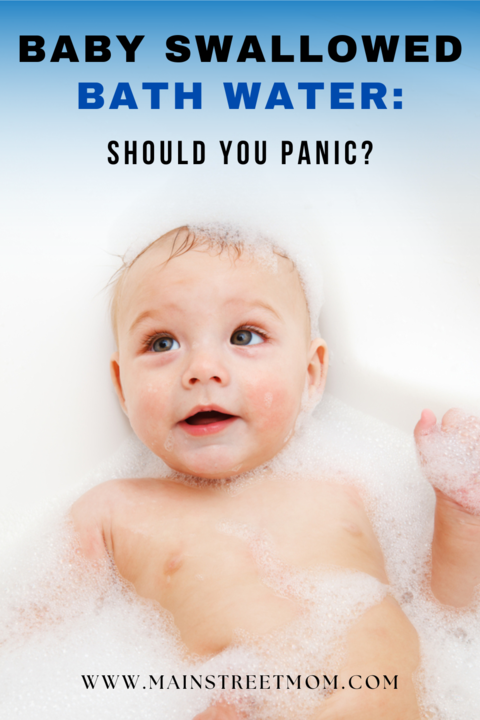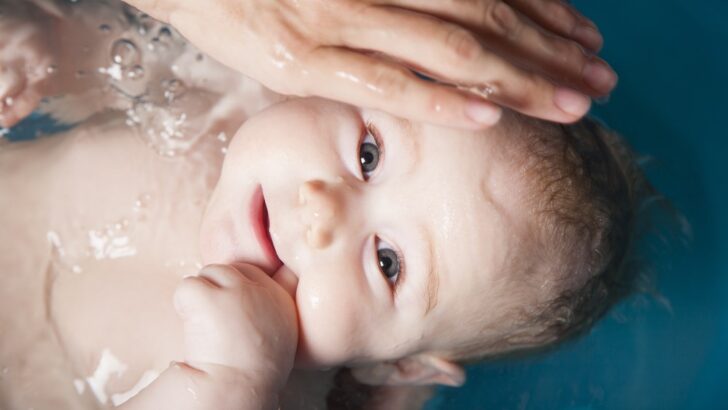“Oh, my God! My baby swallowed bath water! What should I do?” If this is something that is going (or has
been going) through your head, don’t worry. You’re not the only one with the same concern.
Once you become a parent, it seems as though you do nothing but worry. You keep your baby under
constant surveillance, and every cry seems like a cry of despair. You worry whether he’s hungry or not, cold or not, and with pooped diapers or not.
You’d think the worry slowly diminishes as your baby gets older. But nope! It’s here to
stay, for sure.
Bathtime can be one of those stressful situations when parents stress about every single thing. This is perfectly normal and justifiable since it can have some serious consequences, swallowing bath water being only one of them.
So, if you’ve noticed your baby swallowed bath water, and you’re not sure whether to have a panic
attack or not, keep reading this article. We’ll provide you with a lot of useful information, so you’ll know
what and what not to do during your next bathing session.
My baby swallowed bath water! What now?
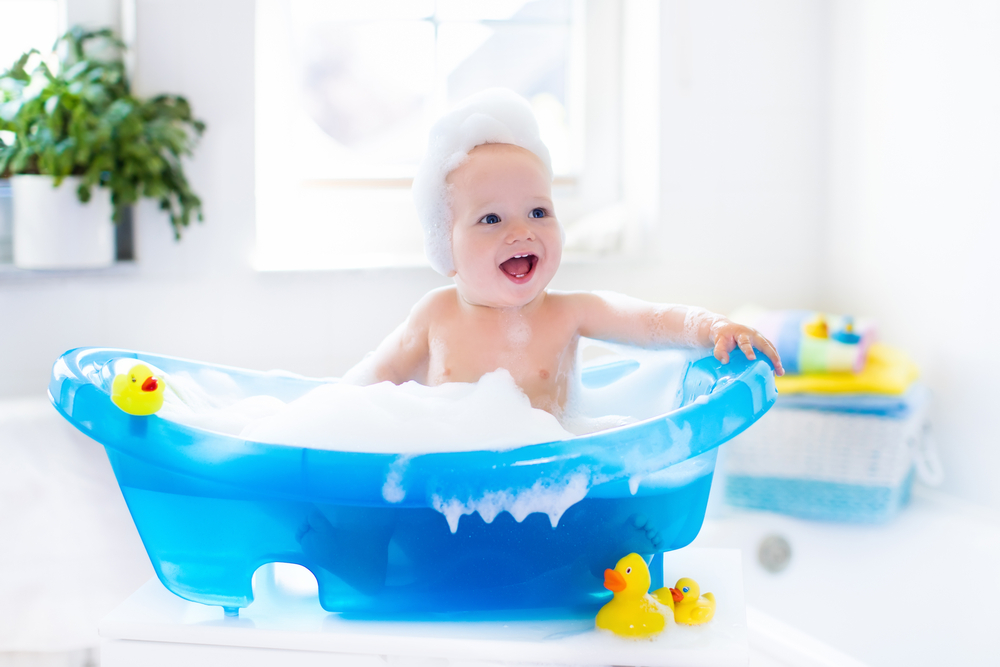
Believe it or not, swallowing bath water happens more often than you think. It’s especially common if the baby is very energetic – constantly moving and being curious – or if the water is poured over his head.
So, you shouldn’t worry too much if it happens. Even if your little one cries. Those tears are probably a result of a shock rather than something serious.
However, there are a few cases when you can have good reason to be upset. Let’s see what those are.
When should you be concerned?
1. If your baby gulps a large amount of bath water
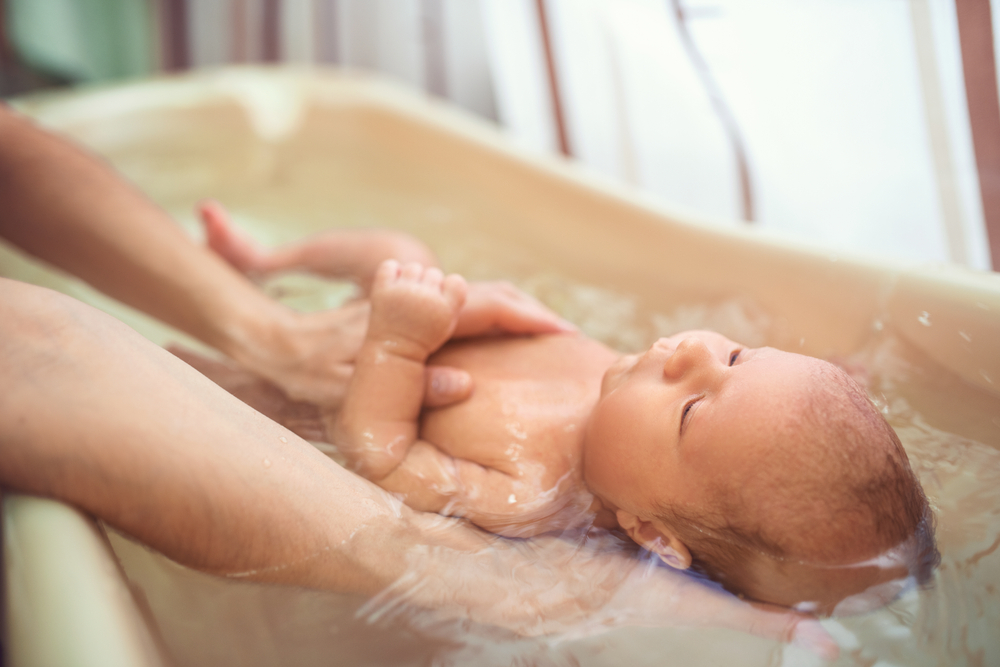
When your baby swallows the water, he might burp or spit it out. That’s a perfectly normal reaction, especially for babies under six months of age.
That’s because water is generally off-limits for babies under 6 months. It can upset their stomach and even lead to water intoxication. Yup, that’s right. Water can be toxic.
When human kidneys are given more water than they can handle, the excess water ends up in the bloodstream. As a result, the blood becomes diluted and electrolytes (such as sodium) become less concentrated.
Too much dilution can result in hyponatremia.
Baby’s kidneys are a lot smaller and not quite as developed as grown-up humans’ are. And while adults have to drink several liters of water in a short period of time to get to the point of water intoxication, a moderate amount of water can be fatal for babies.
If your baby swallows a lot of bath water and doesn’t spit it out, watch out for certain indicators of water intoxication. Some of the earliest symptoms include significant behavioral changes like drowsiness or irritability. Puffiness and swelling in your baby’s face will likely occur as well.
The problem with this condition is that the symptoms can be extremely hard to detect for someone who’s
not very familiar with them. Usually, the first and most obvious symptom many parents notice is when their baby is having a seizure.
However, if you for any reason think your baby might be water intoxicated, call 911 or visit your doctor right away! Don’t wait to be more certain since it might be too late.
2. If your baby swallows soapy water
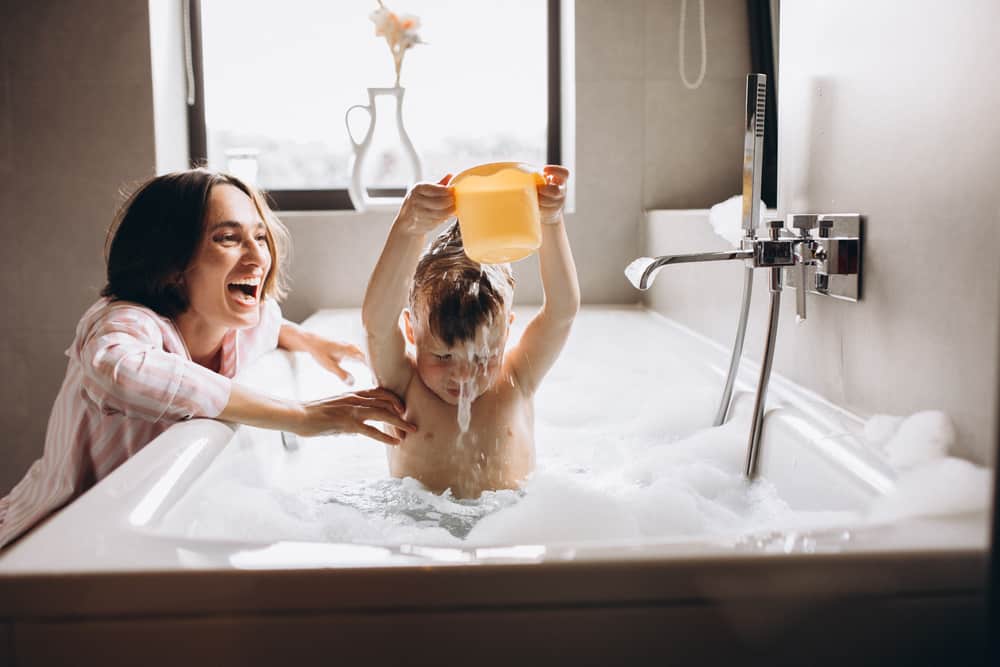
Swallowing a small amount of water is, as we have mentioned, pretty harmless. But if your baby swallowed soapy bath water, that’s when you should ring the alarm.
It might come as a surprise that soaps and shampoos meant for babies can still contain some pretty harmful substances that can pose many health risks.
Some of the ingredients commonly found in baby shampoos and soaps that you as a parent should be aware of are formaldehyde and lauryl sulfate. These ingredients are okay for adults to use, as they help to clean your hair, but they can be extremely toxic for babies.
Formaldehyde is on the list of carcinogens, and it has been connected to causing nasal squamous cell cancer. It can also cause various allergies and skin irritations, with reactions such as burning eyes and throats, stuffy noses, and painful skin rashes.
Lauryl sulfate is not considered to be unsafe or carcinogenic, but it can cause certain temporary irritations
like redness, dryness, and itchiness.
Swallowing soapy water can lead to an upset stomach in your baby. Other than that, there seem to be no other serious consequences.
Because of the specific taste, most babies will not drink too much of the water and will spit it out right away. So, there’s no need to panic too much in this case.
That said, I am a strong believer in organic baby soaps and shampoos and those labeled as fragrance-free, BPA-free, phthalate-free, sulfate-free, etc. You know how the saying goes, “Better to be safe than sorry.”
3. Dry drowning
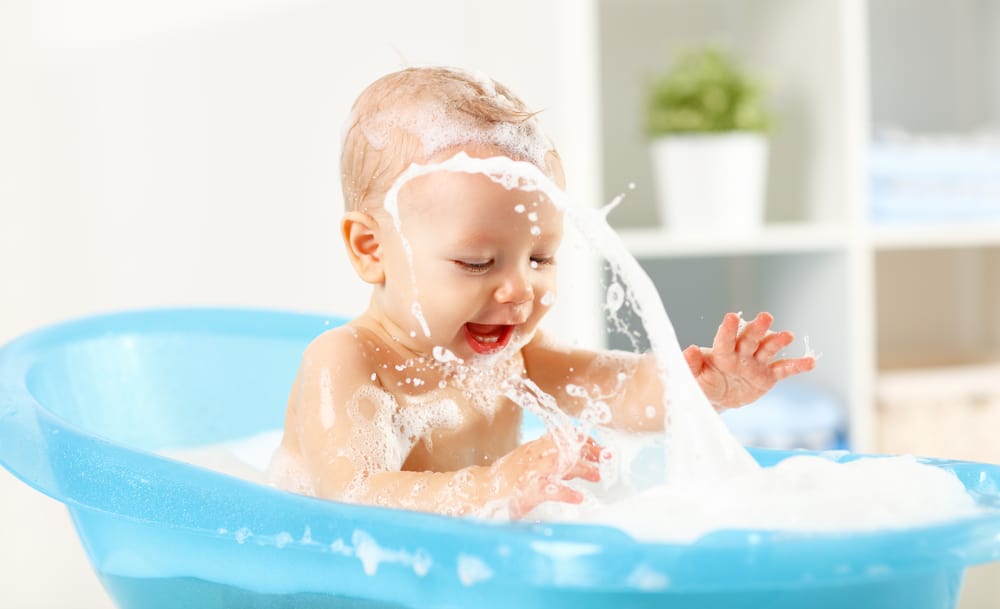
If you noticed your baby swallowed bath water, your motherly instinct (a.k.a. overly worried mind) might automatically go to dry drowning. This is not an actual medical term, though. Doctors call this phenomenon post-immersion syndrome.
When a child or an adult ends up falling into deep water, their natural reaction might be to instantly inhale, which consequently results in swallowing some amount of water. After they are saved, many people assume that the danger is over.
However, after inhaling and gulping down a significant amount of water, the windpipe muscles usually
contract in order to protect the lungs, which makes breathing extremely hard. This means that in dry drowning, the swallowed water actually never makes its way to the lungs.
Dry drowning is more common in kids, and as a parent, you’ll be able to notice the symptoms of it in your
baby right away. Some of them include:
- trouble breathing
- irritability and unusual behavior
- coughing
- lethargy.
Your baby can also experience secondary drowning. It occurs when the lungs “store up” the swallowed water. That’s why many people consider this condition as more similar to “real” drowning.
Both of these conditions can have severe and deadly outcomes. However, while dry drowning usually occurs within an hour of inhaling water, the symptoms of secondary drowning can occur up to two days later.
Some symptoms of secondary drowning include:
- dyspnea (shortness of breath)
- coughing
- weariness and lethargy
- vomiting
- fever
- diarrhea.
It’s important to state that many experts believe the commotion about both of these conditions in babies who swallowed bath water is nothing but an exaggeration.
They believe that, in order for these conditions to happen, your baby’s head has to be completely submerged in water. Which is (and we’re sure you already know this) not a way to bathe your baby. So, there’s no need to worry about these two if your baby swallowed a tiny amount of bath water.
However, if you do happen to be concerned, you can always call 911 and seek immediate medical care or
contact your pediatrician right away.
How to make sure your baby doesn’t swallow any water during bathtime
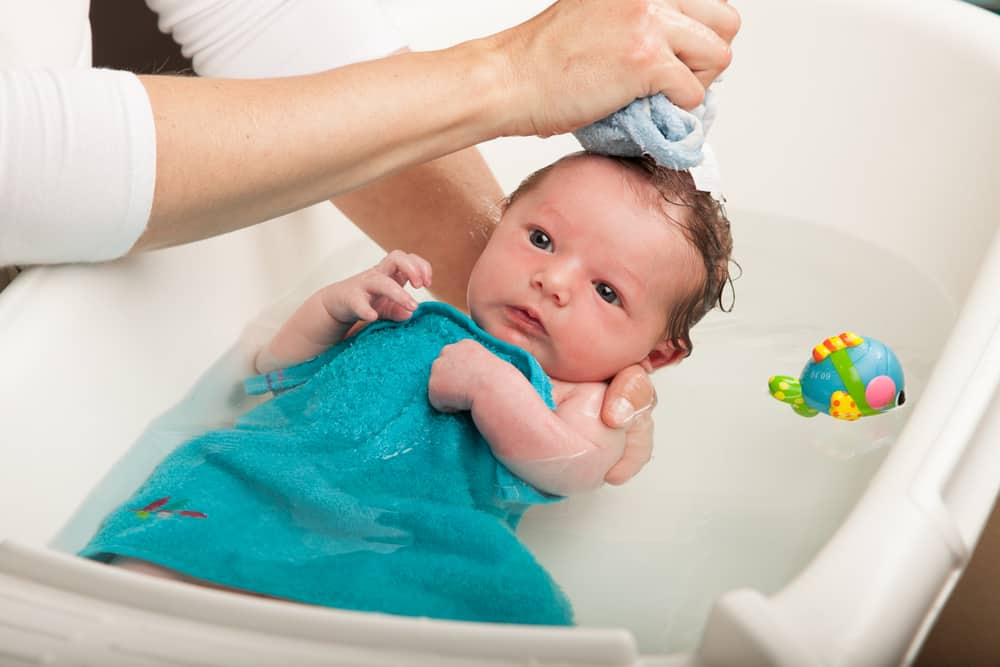
Many parents, especially new ones, are worrywarts; which is totally normal and understandable.
But if you’re tired of constantly stressing over your baby’s bathtime because of him potentially swallowing bath water, there are some precautions you can take to completely prevent it from happening.
Follow these tips below, so you can enjoy those special bath moments with your little one, stress-free.
1. Prepare everything for bathtime
Before you bring your baby into the bathroom, make sure everything you need is already there.
From bath toys, soap, shampoo, thermometer, rinse cups, soft hooded towels, and soft washcloths to baby’s diapers, creams, and clothes to wear after. Every single thing necessary has to be ready.
This is especially important if you have no one to help you bathe your baby in case you forgot something. You shouldn’t, even for a second, turn around to fetch something you need. Your baby should be under constant supervision.
2. Never leave your baby alone in the bath
This second rule ties in with the first one. It is common sense, but there’s no harm in repeating: Your baby should never be left alone, especially not in harmful situations that can have potentially disastrous outcomes.
No matter how low the water level is, never leave your baby in it as she might fall face-first into it and swallow too much bath water or drown.
If you have forgotten something, ask someone else to help you. If you’re alone, please remember the first rule. Or bring your baby with you. Always err on the side of caution.
3. Get a baby seat
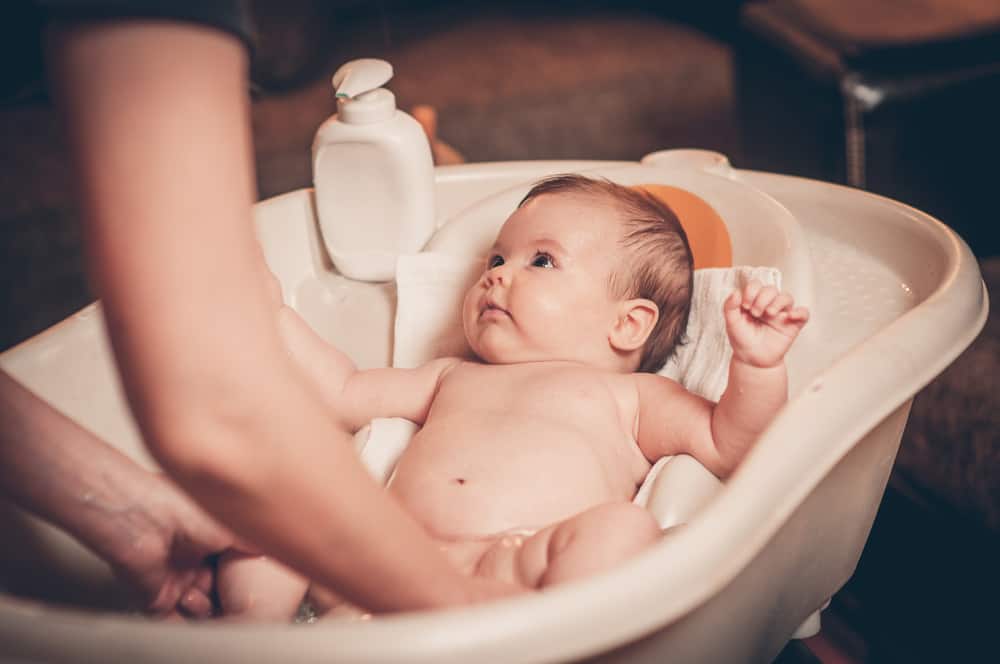
Baby seats are a great way to make bathing your baby a much safer and easier experience. They keep the baby seated and are, therefore, not exactly made for newborn infants.
This is fine because newborns have their own special baths, anyway. These seats are made for babies
who can sit on their own and are amazing since they ensure your baby is “immobilized” during bathtime. So, the unpredictable movements are at least minimized.
Look for baby seats that come with suction cups. This feature will help you anchor the seat inside the tub and completely stabilize it.
4. Get a baby bath cap or visor
Even if you get a baby bath seat and manage to keep your baby’s head above the water, at some point, you’ll simply have to pour some water over your little one’s head in order to wash his hair. By doing so, there’s a high possibility your baby could swallow some bath water.
To minimize those chances, get your baby a baby bathing cap or a visor. Its purpose is to redirect the water away from your baby’s mouth, nose, and eyes. That way, your baby won’t accidentally swallow or inhale it.
5. Set down a bath mat to avoid slipping
Bathtubs can get very slippery. Dealing with all that soapy water can get tricky, especially if your baby isn’t the biggest fan of baths. Therefore, it’s important to set down a bath mat inside your tub.
Even if you are using a baby bathtub inside your own bathtub, having a bath mat underneath will greatly reduce the chances of your baby slipping and swallowing water or even hitting their head on the edge of the tub.
Be sure the bath mat is slip-resistant or has strong suction cups, so it can “glue” itself to the bathtub floor. This will ensure the mat stays put and doesn’t get moved around, either by water or by your little one.
And don’t think a towel will do the job. Because it won’t. It would get wet soaked soon, and it won’t do half the work that a bath mat would.
6. Keep the water level low
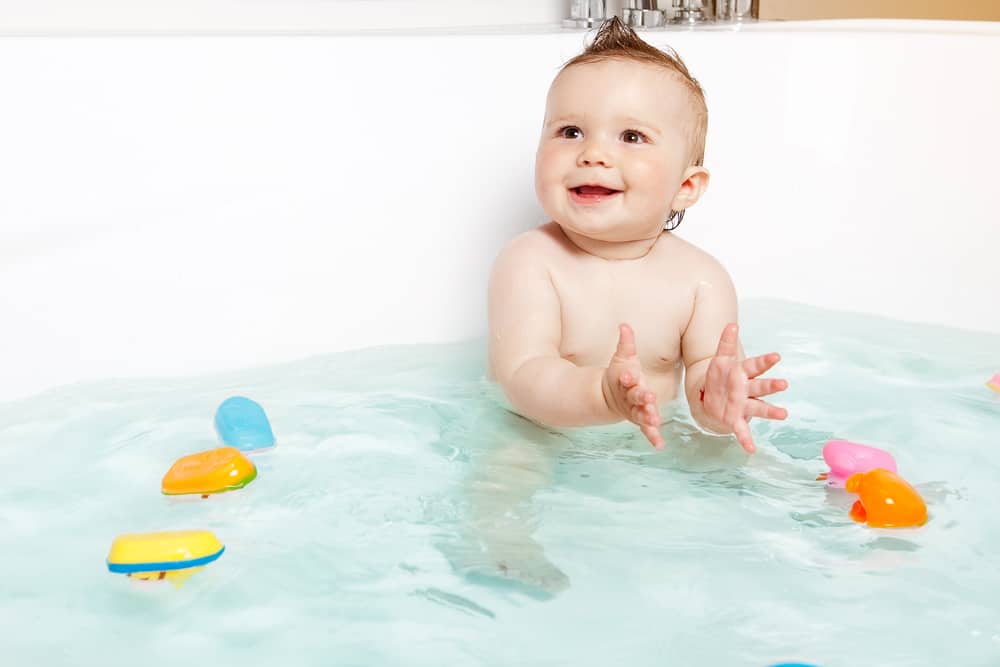
You probably think it’s better to fill your bathtub with enough water to reach your baby’s chest. That will ensure that bathing is more fun for your little one, and he won’t get cold, right?
But you have to be extra careful with how much water you put inside the bathtub since the higher the water level, the higher the chance of your baby swallowing bath water.
It’s best to ensure the tub is never filled with more than two inches of water. Your baby will still enjoy it, and you’ll be at ease knowing he can’t drown.
That said, a little amount of water still doesn’t justify you leaving your baby unattended. You still have to be extra careful and keep your baby under constant supervision.
